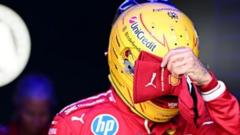Why Did Hamilton Call Him Useless Despite His Talent?

Hamilton's Challenges at the Hungarian Grand Prix: A Deep Dive
Lewis Hamilton, a name synonymous with excellence in Formula 1, faced one of his most challenging weekends at the recent Hungarian Grand Prix. Despite his illustrious career, Hamilton found himself grappling with performance issues that raised eyebrows and ignited discussions about his future in the sport. This article delves into his experience at the Hungaroring, his reflections on the race, and what lies ahead for the seven-time world champion.
The Setting: A Difficult Weekend
Hamilton, who has won a record eight times at the Hungaroring, entered the race weekend with high hopes. However, his performance during qualifying was underwhelming, leading to a 12th-place start on the grid. In stark contrast, his Ferrari teammate, Charles Leclerc, secured pole position, marking Ferrari's first pole of the season. This disparity only magnified the scrutiny on Hamilton and his capabilities as a driver.
Qualifying Woes: Hamilton's Self-Critique
After a disappointing qualifying session, Hamilton did not hold back in expressing his frustration. He described himself as "just useless," a stark reflection of his mental state following the performance. Such candid self-assessment is not uncommon for Hamilton, who often sets exceptionally high standards for himself. Despite the apparent setback, Hamilton remained optimistic about the potential for growth and improvement.
The Race: A Tough Battle
As the race unfolded, Hamilton's struggles continued. He finished the race in 12th place, the same position he started from, a stark contrast to the expectations surrounding his tenure at Ferrari. Meanwhile, Leclerc, after an intense battle with McLaren drivers, faded to fourth, indicating that the Ferrari car still faced challenges in terms of performance and reliability.
Behind the Scenes: Team Dynamics and Strategy
Ferrari’s team principal, Frederic Vasseur, offered a perspective on Hamilton's situation. He acknowledged the difficulties of being a seven-time world champion in a subpar performance context. Vasseur emphasized the challenges of a one-stop strategy employed by Ferrari, which did not pay off on a track known for its limited overtaking opportunities.
Learning from Challenges: Hamilton's Resilience
Despite the challenges, Hamilton highlighted the importance of learning from every experience. He noted that while their pace might not match that of the front-runners, the car was showing signs of improvement. Hamilton emphasized the need to extract more from the vehicle and adapt to its characteristics, which differ significantly from previous models he has raced.
Comparative Performance: Hamilton vs. Leclerc
Throughout the season, a notable trend has emerged in Hamilton's performance relative to Leclerc. Hamilton's average qualifying deficit to his teammate has been just 0.146 seconds, which, while not ideal, is a testament to his skill, especially considering Leclerc's reputation as one of the fastest drivers in Formula 1. The fluctuations in qualifying performance have led to discussions about Hamilton's adaptability to the current generation of ground-effect cars.
Critics and Support: The Mixed Reactions
As with any high-profile athlete, Hamilton has faced criticism regarding his recent performances. Some fans and analysts speculated whether he might retire from Ferrari or even the sport itself. However, Hamilton dismissed these rumors, reaffirming his commitment to returning for the Dutch Grand Prix after the summer break. His determination is a hallmark of his career, and those close to him, including former team principal Toto Wolff, echoed the sentiment that Hamilton is still one of the greatest drivers in the history of the sport.
The Road Ahead: Future Prospects for Hamilton
Looking ahead, the question on everyone's mind is whether Hamilton can secure that elusive eighth title. Wolff believes that with the right car, Hamilton has every chance to achieve this goal. The upcoming changes in regulations and car designs may provide Hamilton with the opportunity he needs to regain his competitive edge. As the sport evolves, so too must its drivers, and Hamilton’s legacy is built on his ability to adapt and overcome challenges.
Conclusion: A Champion's Resolve
In the world of Formula 1, every race presents new challenges and opportunities. Lewis Hamilton's recent experience at the Hungarian Grand Prix serves as a reminder of the sport's unpredictability and the mental fortitude required to succeed at the highest levels. While he faces a difficult period, Hamilton's history of resilience and determination suggests that he will continue to fight for his place among the sport's elite. As we await the next race, one thing is clear: Hamilton's journey in Formula 1 is far from over.
FAQs
What challenges has Lewis Hamilton faced in his recent races?
Hamilton has struggled with qualifying and race performance, finishing 12th at the Hungarian Grand Prix and facing difficulties adapting to the new car dynamics.
How does Hamilton's performance compare to his teammate Charles Leclerc?
Hamilton has shown competitive pace against Leclerc, with an average qualifying deficit of just 0.146 seconds, though his recent results have raised concerns about his form.
What does the future hold for Hamilton in Formula 1?
With upcoming regulatory changes and new car designs, there is potential for Hamilton to regain his competitive edge and possibly secure his eighth championship title.
As we look forward to the next race, will Hamilton's resilience lead him back to the top? The world of Formula 1 is always evolving, and so is the journey of its greatest drivers. #Formula1 #LewisHamilton #HungarianGP
Published: 2025-08-03 21:32:03 | Category: sport



